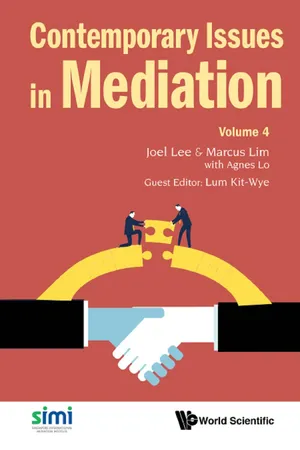
- 184 pages
- English
- ePUB (mobile friendly)
- Available on iOS & Android
About this book
What do nudges and choice architecture have to do with encouraging mediation?
What should one consider when drafting enforceable mediation clauses?
Does negotiating with children hold the secret to becoming better mediators?
The signing of the Singapore Convention on 7 August 2019 heralds a new milestone in mediation. Contemporary Issues in Mediation Volume 4 examines the draft Convention of International Settlement Agreements resulting from mediation and provides some answers to guide the drafting of enforceable mediation clauses. Practitioners would be especially interested in the new section 'Mediation Obligations and Ethics', featuring discussions on mediator's neutrality and confidentiality, as well as a mediation advocate's ethical duty of honesty. A traditionally well-received category 'Mediation Skills' is also expanded with new entries, with one essay on crisis negotiation skills and another that examines how learning from children can help mediators better deal with emotions or difficult parties. Socially conscious readers will no doubt enjoy the research and views presented on an increasingly popular topic, how gender roles shape the power balance in family mediation. As the world heads into a new era with mediation given prominence on the global stage, the valuable insights in this edition will undoubtedly equip you with the necessary knowledge to navigate this space.
Contents:
- Getting to and Beyond Mediation:
- What's in a Nudge? How Choice Architecture Surrounding Dispute Resolution Options Can Increase Uptake of Mediation (Charmaine Yap Yun Ning )
- Mediation, Legal Education and the Adversarial Culture in Singapore (Lim Wei Yang)
- A Comparative Guide to Drafting Enforceable Mediation Clauses (Maryam Salehijam)
- Enforcing Mediation Settlement Agreements: An Examination of the Draft Convention on International Settlement Agreements Resulting from Mediation (Chia Chen Wei)
- Mediation Obligations and Ethics:
- Mediator Neutrality in Singapore: The Siren Call for a Paradigm Shift (Kuek Kai Liang)
- The Case for Confidentiality: Singapore's Mediation Act (Nadene Law Qin Ning)
- A Review of Mediator Neutrality (Ivan Ng Yi Fan)
- The Ethical Boundaries of Honesty in Mediation (Lew Zi Qi)
- Mediation Skills:
- Negotiating with Children and How that Teaches Us to Be Better Mediators (Ho Ting En)
- Learning from Crisis: How Crisis Negotiation Skills Can Help Mediators Deal with Parties in Mediation (Ang Wen Qi Therese)
- Equal but Different? Exploring How Gender Roles Shape the Power Balance in Family-Related Mediation (Lee Kwang Chian)
- Are All Expressions of Anger Equal or Are Some More Equal Than Others? (Wesley Aw Ming Xuan)
Readership: This series is intended for students and professionals in mediation as well as the general public.Mediation;Singapore;Nudge;Choice Architecture;Behavioural Economics;Rational Choice Theory;Dispute Resolution;Cognitive Failures;Cognitive Bias;Cognitive Errors; Motivational Distortions;Enforcement;Mediation Settlement Agreements;International Mediation Settlement Agreement;Convention on International Conciliation;UNCITRAL;Negotiation with Children;Mediator Neutrality;Singapore International Mediation Institute Code of Professional Conduct;SIMI Code;Facilitative Mediation;Power Disparity;Contextual Ethics in Mediation;Gender Roles;Power Balance;Family Mediation;Family-related Mediation;Legal Education;Adversarial Culture;Drafting Enforceable Mediation Clauses;Mediation Act;Mediation Confidentiality;Protection of Mediation Communications;Crisis Negotiation;Emotions;Relationship Building;Active Listening;Expressions of Anger;Honesty;Ethical Boundaries;Mediation Advocacy;Good Faith in Mediation;Community Mediation;Lies;Negotiation Theory;Party Autonomy;Mediator's Privilege;NUS;National University of Singapore;Faculty of Law;Informed Consent;Convention on Choice of Court Agreement;New York Convention;Singapore Mediation Centre;Libertarian Paternalism;Status Quo Bias;Overconfidence Bias;Salience Bias;Litigation;ADR;Choice Mapping;Alternative Dispute Resolution;Appropriate Dispute Resolution;Arbitration0 Key Features:
- Foreword by William Ury, leading international mediator and negotiator, co-author of the seminal title "Getting To Yes" in the dispute resolution industry
- Collection of essays on unique topics in mediation, both theory and practice
- Edited by leading negotiation expert Professor Lee Tye Beng, Joel, and the Executive Director of the Singapore International Mediation Institute, Marcus Lim. This edition will also include a Guest Editor, Associate Professsor Lim-Lum Kit Wye, Principal Mediator with the Singapore Mediation Centre and Associate Dean (Undergraduate Student Life), College of Business (Nanyang Business School), Nanyang Technological University
Frequently asked questions
- Essential is ideal for learners and professionals who enjoy exploring a wide range of subjects. Access the Essential Library with 800,000+ trusted titles and best-sellers across business, personal growth, and the humanities. Includes unlimited reading time and Standard Read Aloud voice.
- Complete: Perfect for advanced learners and researchers needing full, unrestricted access. Unlock 1.4M+ books across hundreds of subjects, including academic and specialized titles. The Complete Plan also includes advanced features like Premium Read Aloud and Research Assistant.
Please note we cannot support devices running on iOS 13 and Android 7 or earlier. Learn more about using the app.
Information
What’s in a Nudge? How Choice Architecture Surrounding Dispute Resolution Options Can Increase Uptake of Mediation
I.Introduction
II.Behavioural economics explanations: Why parties do not mediate as much as they should
A.Cognitive biases
(1)Status quo bias
(2)Overconfidence bias
(3)Salience bias
B.Inability to accurately predict utility
C.Focus on appearance of fairness
III.Applying behavioural economics insights to practice: Evaluating existing measures and proposing reforms
A.Presumption of ADR in setting a defau...
Table of contents
- Cover Page
- Title Page
- Copyright Page
- Contents
- Foreword for the Series
- About the Guest Editor
- About the Editors
- Editors’ Note
- About the CIIM Essay Competition
- Part 1 Getting to and Beyond Mediation
- Part 2 Mediation Obligations and Ethics
- Part 3 Mediation Skills
- End Notes